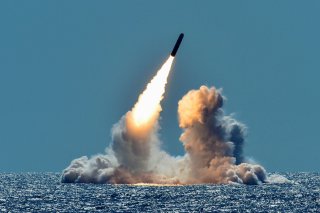How Feminists, Survivors, and Non-Nuclear States Banned the Bomb
The Treaty on the Prohibition of Nuclear Weapons entered into force on January 22, 2021. This historic treaty prohibits signatories from developing and possessing nuclear weapons.
This week on Press The Button, guest host Alex Hall, Policy Associate and Special Assistant to the President at Ploughshares Fund, sat down with Ray Acheson, Director of Reaching Critical Will, to discuss their book Banning the Bomb, Smashing the Patriarchy. The conversation is particularly timely as this week marks the seventy-sixth anniversary of the United States dropping nuclear bombs on Hiroshima and Nagasaki. A notable anniversary being that the Treaty on the Prohibition of Nuclear Weapons (TPNW) is the first international agreement that requires countries to assist victims of the use and testing of nuclear weapons. The TPNW entered into force on January 22, 2021. This historic treaty prohibits signatories from developing and possessing nuclear weapons. Currently, eighty-six countries have signed the treaty.
Although many say the TPNW came out of the frustration felt by non-nuclear states, Acheson says it “comes from positivity... it comes from the majority of countries, as well as activists and survivors and humanitarian agencies coming together to do something that's powerful.” While the treaty doesn’t set parameters for the elimination of nuclear weapons, it’s a powerful tool that sets the stage for nuclear disarmament.
One of the most powerful aspects of the TPNW is its historic focus on the humanitarian and environmental impacts of nuclear weapons. It allowed for perspectives to be present at the United Nations (UN) that are typically not represented at similar conferences, like those on the Treaty on the Non-Proliferation of Nuclear Weapons, including indigenous and feminist perspectives. Acheson remarks that while delegates had previously heard accounts from hibakusha—survivors of the bombings of Hiroshima and Nagasaki—the TPNW expanded their perspectives by including indigenous perspectives. Voices from a broader community of survivors were also brought in, including “those who've been living under nuclear weapons, whether it's from production and uranium mining through testing [or] radioactive waste storage.”
Further, the TPNW allowed for a broader conversation on the patriarchal element of nuclear weapons discussions, and highlighted the lack of gender equity in participation around these discussions. Acheson also adds that the UN delegates were “alarmed by the research [presented] around gendered harms caused by ionizing radiation and how women and girls’ bodies can be disproportionately affected.” These new perspectives challenged the typical nuclear weapons discourse that can be found at the UN.
This nuclear justice movement has historically had links to other social justice movements. Acheson reminds listeners that “there's a strong connection between racism and structural discrimination and nuclear colonialism and imperialism...these connections were drawn long before... in the 60s and 70s.” There’s a need for coalition building among these social justice movements, and Acheson argues that “it's really important to continue this analysis into the present day and there's all kinds of connections, of course, now that we can draw between the abolitionist movements.”
There are inherent links between the movements calling for the abolition of nuclear weapons, police, prisons, and borders, among others. Acheson explains that “[a]ll of these are elements of state violence that we are confronting every single day.”
This connects to the conversation of divestment as well, as divesting money from nuclear weapons frees funds up for human needs like “care and housing and education and justice.” Divestment campaigns, such as the International Campaign to Abolish Nuclear Weapons’ (ICAN) Don’t Bank on the Bomb, are having more success as companies no longer want to be invested in or associated with weapons that are illegal under international law.
When asked what individuals can do to get involved in the antinuclear movement outside of a divestment campaign, Acheson named many of the ICAN campaigns, including the ICAN Cities Appeal, the ICAN Parliamentary Pledge, and the Schools of Mass Destruction project. As Acheson concludes, the TPNW “isn’t the end. The TPNW is a tool, and we’ve always envisioned it as a tool in order to achieve nuclear disarmament.”
You can find Ray Acheson’s book Banning the Bomb, Smashing the Patriarchy here.
The entire interview with Ray Acheson is available here on Press the Button.
Deseri Tsepetis is the Policy Analyst at Ploughshares Fund, a global security foundation.
Image: Reuters.

